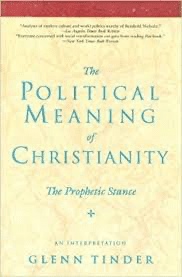The Political Meaning of Christianity: Power & State
Several readers and I are here discussing the book The Political Meaning of Christianity by Glenn Tinder (HarperSanFrancisco, 1991). Those who are reading the book, and have read the pages I’m commenting on, are welcome to comment and question. Others are welcome to question.
Two sections of Chapter Three being discussed here are “Power” and “The State and Its Justification” (pp. 133-149). (Chapter Three is “Liberty.”)
Predictably, Tinder argues that true, authentic Christianity is dubious about power while being unable to discard or avoid all entanglements with power. What does Tinder mean by “power?” Clearly here he means coercive enforcement of rules or laws or desires on others. The basic principle of Christianity is agape love and that is incompatible with coercion.
On the other hand, Tinder argues, the fallen, broken condition of this world makes power inevitable, even necessary. However, power itself is not a good thing; it corrupts. “Power is a narcotic for both rules and masters” and “Power can enable us for awhile to forget that we are merely human.” (138)
On the last two pages of this section Tinder asks whether God has power. “God,” he says, “is fully revealed in the life of a crucified , and hence wholly powerless, human being.” (138) He prefers “grace” to “power” when talking about God’s ability to accomplish his purpose.
On page 139 Tinder dives briefly into the question of church and state. Power, he asserts, is inappropriate to the church and therefore the church must remain distinct from the state. That raises the question of the state and its justification by Christianity.
Tinder rejects secular theories of the reasons for the state, justifications for the state, and argues instead for divine command theory of the state, of the justification for the state. The state, for all its moral ambiguities, exists by God’s will for the purpose of protecting the dignity of the individual. “To stand prophetically, then, is to be skeptical of actual states but supportive of the state in principle.” (145)
I am, of course, skipping over many things Tinder says about power and the state. Only those who are reading the book can fill in the blanks.
I agree with Tinder about both power and the state. I am not so sure that non-resistance to evil power is impossible without using power. He seems to think that policies and practices of non-resistance inevitable entangle one with power. That is what Niebuhr thought, too.
I find Tinder’s use of Abraham Lincoln as the paradigm of a Christian use of the state interesting. See page 147. Having lived in the South of the United States I know many Southern Christians would not agree. But I do agree that at least Lincoln stands as a symbol of a good Christian approach to the use of power for a good cause.
I especially agree with this statement: “For using power and violence, there is no full justification on earth.” (146) And I agree with Tinder that government is instituted by God. And I agree with him that there is an inescapable element of anarchy in Christianity: “Love neither sacrifices nor coerces.” (142)
How does Tinder’s view of power and the state related to our condition in America today? Far, far, far too many American Christians are and have long been too passionate about power and the state, wishing to use both to establish “the American way” almost by any means necessary (or possible).
In about a week, I will comment here on Chapter Four: Social Transformation, sections “Prophetic Hope and Social Reform” and “Communal Liberation and the Will of God” (pp 152-160).
*Note: If you choose to comment, make sure you have read these pages and are reading the book with me/us. If not, you may ask a question. Make sure your comment and/or question is no more than about 100 words, on topic, addressed to me, civil and respectful, not hostile or argumentative, and devoid of pictures or links.*














